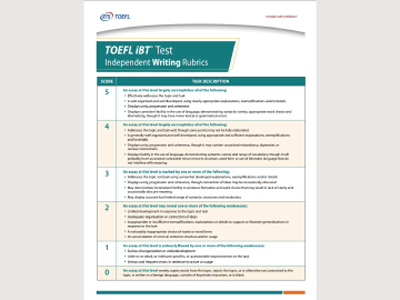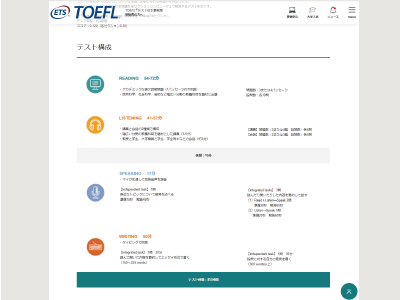TOEFLテストや英語学習を通してグローバル人材になるためのヒントをお届けします。
- トップページ
- ETS公認トレーナー直伝 TOEFL iBT®テスト対策、ここがポイント!
- 第8回 TOEFL iBT®テストWriting対策 No.2 Integrated Writing注意点

2013.10.22
第8回 TOEFL iBT® テストWriting対策 No.2
Integrated Writing注意点
皆さんこんにちは。秋もだいぶ深まってきましたね。TOEFL®テスト学習の進捗状況はいかがでしょうか。
前回(TOEFL iBT® テスト Writing対策 No.1 試験の目的、採点の仕組みなどを理解しよう)では、簡単にIntegrated Writingの概略に触れましたね。念のために該当部分を以下に再掲載します:
また字数の目安として、150-225 wordsという数字が出ているという話もしました。
それでは今回は、実際にIntegrated Writingを皆さんに体験していただき、それを基に今後の対策を考えるように指導していきます。それにあたり以下が必要になります。
- - パソコン (実際にキーボードでエッセイを作成していただくため、スマホなどではなくパソコンでお願いします)
- - イヤホン・ヘッドホン (音声が聴ける準備をお願いします)
- - メモ用紙 (ReadingとListening、両方からの情報をメモする必要があります)
-
- パソコンの「メモ帳」「ワードパッド」などの文章作成ソフト
「ワード」でもよいのですが、スペルチェック機能などがついているため(赤線や緑線が表示されたりする)、
本当のご自分の実力を測るためには、できればそれらの機能がない、ワード以外のプログラムが
良いでしょう。 - - タイマー (読み・書きの時間を計るため)
それでは準備はよろしいでしょうか。では本試験通りに以下の手順で進めていきましょう。
- - Reading (3 minutes)
- - Listening (1-2 minutes)
- - Writing (20 minutes)
では各自で時間の管理をお願いします。ではどうぞ!
Directions:
You have 20 minutes to plan and write your response. Your response will be judged on the basis of the quality of your writing and on how well your response presents the points in the lecture and their relationship to the reading passage. Typically, an effective response will be 150 to 225 words.
Reading Time: 3 minutes
Reading passage(PDFファイルが開きます)
続いてListeningです。ここをクリックして音声ファイルを聴いてください(※音声がすぐ流れます)。

Question:
Summarize the points made in the lecture, being sure to explain how they respond to the specific points made in the reading passage.
Writing time: 20 minutes
さて各自で回答はできましたか?それではポイントをいくつか振り返りましょう。
まずReadingの方のポイントですが、主張したいポイントが全体として1つあり、それをサポートするポイントが3つあります。今回はthe Chevalierのmemoir(= 自伝、伝記)はaccurateではない、というのが全体として主張したいポイントですね。では何故memoirが正確でないのか、そのサポート・理由をreadingから3つ確実に理解しましょう。
-
1. In the memoir, the Chevalier claims that he was wealthy while living in Switzerland, but since the Chevalier is known to have borrowed money there, he cannot have been very rich.
(借金があったことで知られているため、金持ちではなかったはずだ) -
2. The memoir claims to recount accurate conversations between the Chevalier and the famous writer Voltaire; this cannot be true, since it was written so many years after the conversations occurred.
(Voltaireとの会話の何年も後に自伝は書かれたため、会話の内容が正確ではない) -
3. The memoir states that the Chevalier escaped from a Venetian prison by making a hole in the ceiling and climbing through the roof; this is unlikely, since the Chevalier could have asked politically
well-connected friends.
(政治家とのパイプラインがあったので、監獄に穴を開けて脱出しなくても済んだはずだ)
続いてListeningです。各自でここをクリックしてトランスクリプトをご確認ください。できれば音声をもう一度聞きながらスクリプトを読むことをお勧めします。
さて内容の確認はできましたか?Readingで主張されたポイントに対して、Listeningの内容が反論や矛盾点の指摘になっていることに気がつきましたか?これが現在出題されているIntegrated Writingの主流のパターンですので覚えておきましょう。
それでは実際にどのような点が矛盾だったのでしょうか?リスニングのポイントを振り返りましょう。
-
1. The Chevalier’s wealth was in the form of property that had to be sold in order to generate cash. So he wasn’t poor; he just had to borrow money for a few days while he waited for his property to be sold.
(資産は持っていたが現金に換えるまでに時間を要した。その間、お金を借りる必要があっただけで、貧乏だったわけではない) -
2. Each night after the conversations took place, the Chevalier wrote down everything he could remember from them. Witnesses confirm that when writing his memoir years later, the Chevalier regularly consulted these notes.
(毎晩Voltaireとの会話の後に、会話の内容を記しており、自伝を書く際にそれらを参照にしていた) -
3. Other prisoners who had even more powerful political connections were never able to bribe their way to freedom, so the Chevalier probably couldn’t either. Also, prison records indicate that soon after the Chevalier’s escape, the ceiling of his room in the prison had to be repaired.
(より強力な政治家とのコネがある他の囚人達ですら、賄賂を使って脱獄することはできなかった。またthe Chevalierの脱獄後に、監獄の天井を修復する必要があった)
ということで、Readingで挙げられた3つのポイントに対して、それぞれ反論・否定しているのがわかりますよね?もちろん、毎回きれいに100%真っ向から否定するわけではありませんが、何らかの反論材料が提示されるようになっています。
それでは参考までに簡単な回答例を挙げておきますので、参考にしてみてください。青字の部分がListeningの要点、赤字がReadingの要点になっています。
The lecturer argues that the accuracy and reliability of the Chevalier’s memoir cannot be doubted. For one, the Chevalier did not have financial problems as the reading claims he did. He had assets that could be sold, but it took time for the transactions to be completed. While it is true that he had to borrow money from merchants, it was only while he waited for his assets to be cashed. It did not mean that he was poor.
In addition, while the accuracy of the Chevalier’s conversations with Voltaire is doubted, according to the professor, the Chevalier wrote down everything about the conversation each night. In fact, when the Chevalier was writing his memoir, he was witnessed to be using his notes. These suggest that the Chevalier’s memoir was written with certain accuracy.
The final point is about the Chevalier’s escape from prison. Although the Chevalier had connections with politicians, it is unlikely that he was able to use them to escape from prison because other prisoners with even stronger political connections were unable to use bribery to escape. Rather, it is more plausible that the Chevalier escaped from prison by drilling a hole in the ceiling because after his escape, the ceiling of his prison cell had to be repaired.
All in all, the lecture’s argument contradicts what the critics of the Chevalier say about his memoir.
いかがでしょうか。青字と赤字のバランスからもわかるように、あくまでもListeningで主張されていたポイントを中心にエッセイを展開することが重要です。そしてそれらがどのようにReadingと矛盾するかを示すことができれば、問題が要求している点について明確に答えることができるわけです。
それでは今回はここまでにしましょう。ではまた次回(TOEFL iBT® テストReading対策 No.2 スコアアップの心得10か条)に!

- 五十峰聖先生
- ETS Authorized Propell® Facilitator
ETS TOEFL ITP® Teacher Development Workshop Facilitator - 桜美林大学 芸術文化群 特任講師
- プロフィールはこちら

- TOEFL iBT®テスト スコアガイド(Writing)
- TOEFL iBTテストのWritingセクションの採点基準が分かるスコアガイドもチェックしてください。

- TOEFL iBT®テスト テスト構成
- テストの問題数や内容はテスト構成をご確認ください。




